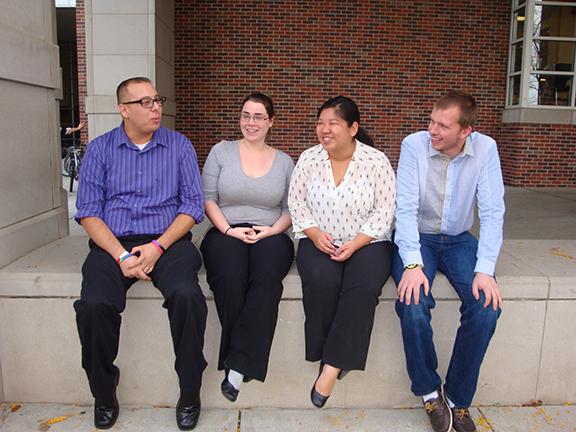
EDAD students explore social justice at conference
06 Nov 2014 By Brad Stauffer
Four graduate students in Educational Administration are attending the 2014 Institute on Social Justice, Nov. 9-11, in Seattle. Joel Orozco-Almeida, Jessica Weed, Lynn Huynh and Kevin Rush are in the second-year cohort of the student affairs master’s degree program. According to Corey Rumann, assistant professor of practice in Educational Administration, it’s unusual for students in a student affairs program to take such a proactive interest in social justice issues and attend a conference dedicated to the topic—especially when they are mostly paying their own way.
“I think it is unique in the sense that not a lot of students commit themselves to social justice at this level,” said Rumann. “It speaks highly of our program to have this many students attend an event like this and communicates our commitment to addressing issues related to social justice in student affairs.”
The Educational Administration Student Affairs program at UNL is one of the few nationally whose students participate in a social justice retreat as part of their experience in the program. The emphasis on social justice is motivating students to learn more and think about the practice of social justice in their profession.
“We need to prepare ourselves to work with students who have vastly different life experiences than we have,” said Weed. “In order to do that, we need to take into account all the factors that affect our students, including their race, gender, sexual orientation, religion and other social identities they may hold. This is where social justice comes in—trying to learn about ourselves and others.”
“I think that in any future work environment that I will be a part of, I will be working with individuals who are different than I am, in a number of ways,” said Rush. “For me, my social justice journey has really allowed me to be intentional with how I listen to people. Listening for meaning and understanding is a great way to get a sense of the experiences that our students are facing.”
Huynh was first exposed to social justice in high school when to support a gay friend, she joined the Pride Alliance organization at her school. She transitioned from not wanting to be identified as “one of them” to being the group’s president. She is excited to attend the Institute on Social Justice “to more clearly define what social justice means to me” and “to share where I started, because I feel it is important for people to understand that this does not just happen, and I do not just get it. Social justice for me is a framework in how we do things, but also a life style.”
Orozco-Almeida’s motivation for attending the conference comes from practical experience in his college journey. “In the process of identifying what it means for me to have a social justice lens to my daily life and the work that I do, I have found that it is exhausting and not a lot of people truly care to follow [up] on action items towards the work of social justice issues,” he said. “I am hoping this conference can provide context in regard to best practices and implications to implement social justice efforts in higher education and increase my network of individuals who share a passion for social justice.”
The 2014 Institute for Social Justice is sponsored by the American College Personnel Association and is designed for students and others to “learn or refine ways from experts to address the challenges of infusing social justice into your everyday activities and conversations.”
College of Education and Human Sciences
Educational Administration